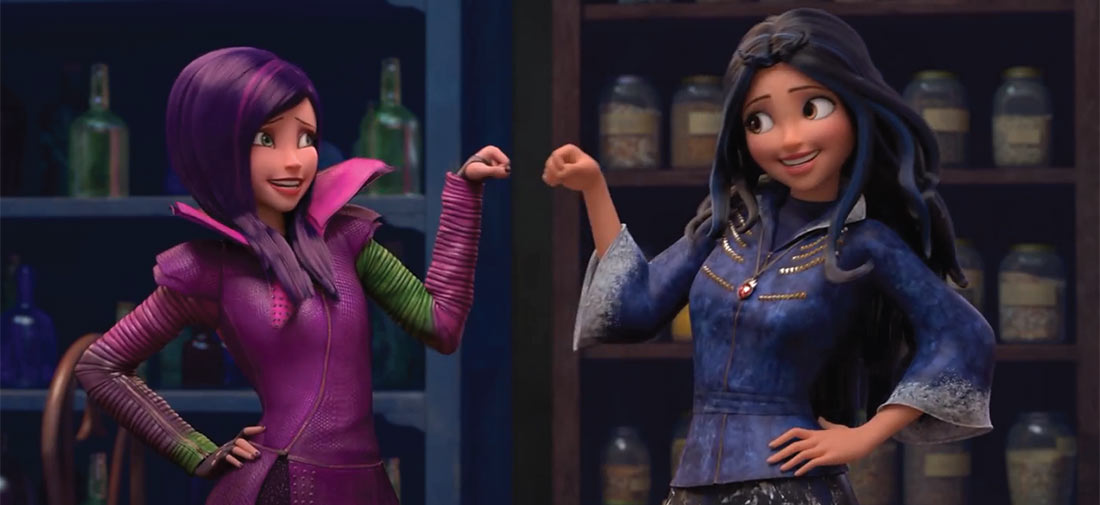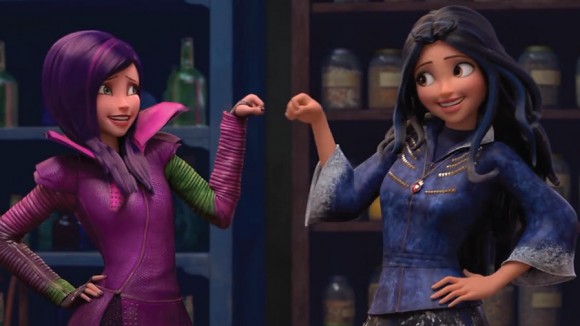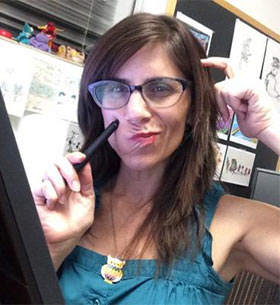

‘I’m Not Going to Be Left Behind’: An Interview with ‘Descendants: Wicked World’ Director Aliki Theofilopoulos
Animator, story artist, character designer, Emmy-nominated songwriter, and director Aliki Theofilopoulos has learned a thing or two about perseverance, and rising above fear, throughout her two decades in the industry.

Theofilopoulos started as an in-betweener on Disney features like Hercules, Tarzan, and Treasure Planet, and eventually moved on to work in character design for Nickelodeon’s Catscratch and Chalkzone. She subsequently landed back at Disney, spending seven years as a storyboard artist on the popular kids series Phineas and Ferb.
One of only two female directors currently at Disney Television Animation, Theofilopoulos helms the studio’s new short-form series, Descendants: Wicked World, which is based on Disney’s 2015 made-for-TV film, Descendants. Cartoon Brew sat down with Theofilopoulos at the picturesque Greek island of Syros, during the Animasyros International Animation Festival, to discuss the highs and the lows of her continuing journey.
Cartoon Brew: Over 20 years, you’ve taken on many roles and climbed the career ladder from in-betweener to director. What have been some of the decisive moments for you?
Theofilopoulos: I found that every time I experienced what I perceived to be a failure or loss of some kind, it always led me to an amazing new adventure. Following graduation, I submitted my portfolio for a clean-up job at Disney’s feature animation department in Los Angeles. While my friends got accepted, I was told to test for Disney Florida. So I put new drawings in my portfolio and brought it back to Disney with a note to please take another look. They then accepted me into their animation trainee program, which was phenomenal.
Another important moment was meeting Fred Seibert during my first television job on the show, Chalkzone. I created two animated shorts with him at Nickelodeon. They didn’t get picked up, but looking back now it wasn’t only about getting those shows greenlit to series, but rather about growing from an animator into a filmmaker and creating work that led to other opportunities.
The creator didn’t like what I was doing on the show Catscratch, so my first inclination was to work harder and shape-shift myself, which is what had always worked for me. But my self-esteem tanked so hard that I thought my time in the industry was over! Artists have this thing where we want everybody to love everything we do, but that’s just not possible. On Catscratch, I learned that not everybody’s going to like what I do, and that’s okay. I learned not to let a negative situation define me. Sometimes a production just isn’t a good fit, and sometimes it’s time to move on, which is what I did.
The most scared I’ve ever been is when I got a job as a story artist on Phineas and Ferb. I had done only two full storyboards, ever, on my shorts, and I didn’t think I’d make it at the show. But I have a rule: If I’m afraid to do something, that means I have to do it. So I rose to the challenge, and my time at Phineas and Ferb became one of the most important turning points of my career.
Over the years, I’ve had projects in different stages of development that didn’t come through. Each time the plug got pulled was very disappointing, but I wouldn’t allow myself to give up. I just kept going, and my tenacity paid off. I was offered the opportunity to help develop and direct Descendants: Wicked World. So the most important thing I have learned is that when you’re at a point in your career where you’re challenged, don’t be scared and hide. Instead, be courageous and take a chance.
At the moment, Kat Good and you are the only women directors at Disney Television Animation.
Theofilopoulos: I know that I’m supposed to say, “On behalf of womankind, yes, I am simply a director.” But there’s no way to deny that my experience as a woman is part of my life. So why not see that as something of value, as something I can add to a project? Furthermore, I don’t want to be embarrassed about the things that make me typically female. I think it’s fun to celebrate those things, and be strong and smart and empowered. I want to kick ass in my career and wear great lip gloss! [laughs]
Is it generally harder for women to advance in animation?
Theofilopoulos: Looking at the numbers, one has to acknowledge that there is indeed a gender gap, although I don’t think guys are deliberately shutting women out. Perhaps they’re just hiring their friends. In my younger days, I thought you just had to work hard and it’ll work out. But after 20 years, it’s been impossible to ignore that often women are usually quieter in meetings when men are present. They often don’t believe in themselves enough to speak up. I used to be that way. But I am very driven, so I decided I was going to face the things that were making me feel insecure and rise above them. I’m not going to be left behind.
Descendants: Wicked World is part of a huge franchise. How much creative freedom do you have as its director?
Theofilopoulos: Descendants is a massive studio project, with many ideas in development and groundwork laid out by my partner on the project, Jenni Cook. So when I came on board for the animated series, the challenge was to develop something that was unique in itself, but at the same time could coexist with the existing franchise, while supporting the needs of the different studio departments, such as dolls, apps, and so on.
It’s important for creators to understand that, whether they’re working on existing properties or developing their own series, they are going to be working in partnership with executive teams. Studios will always have certain needs, and it’s up to creators to know when to fight for their vision when the studio’s needs varies from their own. They need to know when to say, “You know what? Yes, I can provide this need that you have.” In the case of Descendants, we’ve had a really supportive executive team.
What do you feel has been your most important contribution to the Descendants franchise?
Theofilopoulos: Descendants’ characters are different types of girls, which is something I think is really successful. The animated series continues that theme of discovering who we are, without being apologetic or embarrassed by any of it. I wanted strong female characters. That doesn’t necessarily mean having a girl wield a sword; that’s not the only way to define a strong female character. There’s also no need to be apologetic about being a girly girl; being a girly girl doesn’t mean you can’t be funny or like science.
I paid attention to the quality of animation; Jenni and I wanted it more in the vein of Disney’s feature animation. Many times, we’d say, “I hope our feature animation friends aren’t going to give us crap about this scene.” [laughs] Obviously, we don’t have the same sort of structure that Disney’s feature animation has, but I think under the circumstances the performances came out pretty well.
For Wicked World’s animation, you worked with an overseas studio. Was it difficult to direct from such a distance, since this is your first CG project?
Theofilopoulos: There isn’t really a difference between directing performances in 2D or CG. The personality of the character, and the style of performance, dictates the animation. With CG, it seems easier to lose yourself and over-animate performances. Every moving body part should be motivated by something. With hand gestures for example, I tell animators to pick two hand accents and lose the rest.
Reference footage was the best way to communicate the type of performances I wanted from our overseas studio. I walked through every episode, acting out all of their performances in front of a camera. Wicked World’s performance style is pretty contained and realistic, which fits with its sitcom-like cinematography. We did add a bit of cartoonishness by pushing character expression, but I tried to be choosy with where we applied it. I think the animators have been doing a fantastic job on this.
Besides directing Wicked World, you’re developing your own original television series at Disney. Can you walk us through that?
Theofilopoulos: Some years ago, a couple projects of mine died, and I was so devastated. I had spent years supporting someone else’s vision, and I loved doing it, but I had no original ideas of my own anymore. I didn’t even own a sketchbook, or a pack of markers. I was lost. So I met with my agent, who said something like, “Look at your life. What do you want to say? What’s important to you? What do you want to make?”
One day, I doodled a new character on a post-it and stuck it on my desk. Phineas and Ferb co-creator Dan Povenmire walked into my office to look at a scene, noticed the drawing, and said, “Wait a minute, who and what is that? You have to develop her!” So I did some more sketches, mostly story moment-type drawings, and posted them online. There was such a response to her that I started to feel like there was something really special about the character.
So I next submitted a piece with my new character for an art show held at Disney Television Animation, knowing there would be some executive eyes on it. One of the executives saw it, grabbed me by the arm at the reception, and said, “Oh my God, you have to pitch her! She’s an effing star!”
I shaped her world a bit more for a meeting I had with development people, but I didn’t yet write anything down. When I’m pitching something at an early stage, I always bring rough work so executives can comment and contribute their thoughts. A meeting like that is the place to find out the studio’s needs, and to see if there can be a partnership in further developing the idea. Once I narrowed my concept down even more, I created a more formal pitch with the senior vice-president of Disney Television, who then and there offered me the opportunity to develop it.
A friend once told me that getting your own series is like winning the lottery three times. The first time is getting the green light for development; the second time is getting the green light for a pilot; and the third time is getting the green light to go to series. With this project, I’ve so far won the lottery twice. I hope to hit that third win.
Are you afraid your new series will be cancelled before going into production, like several of your previous projects?
Theofilopoulos: Definitely. My project seems to have everything going for it right now, but there is still a chance it won’t go to series. It’s like dating. Some dates aren’t the right fit, sometimes it’s just bad timing, sometimes things work out great, and other times they leave you heartbroken. But you can’t give up just because things don’t work out. Right now, it feels like I’ve met my perfect match. My new show is my soulmate, different from everybody else. I hope this project ends up being “The One!”
